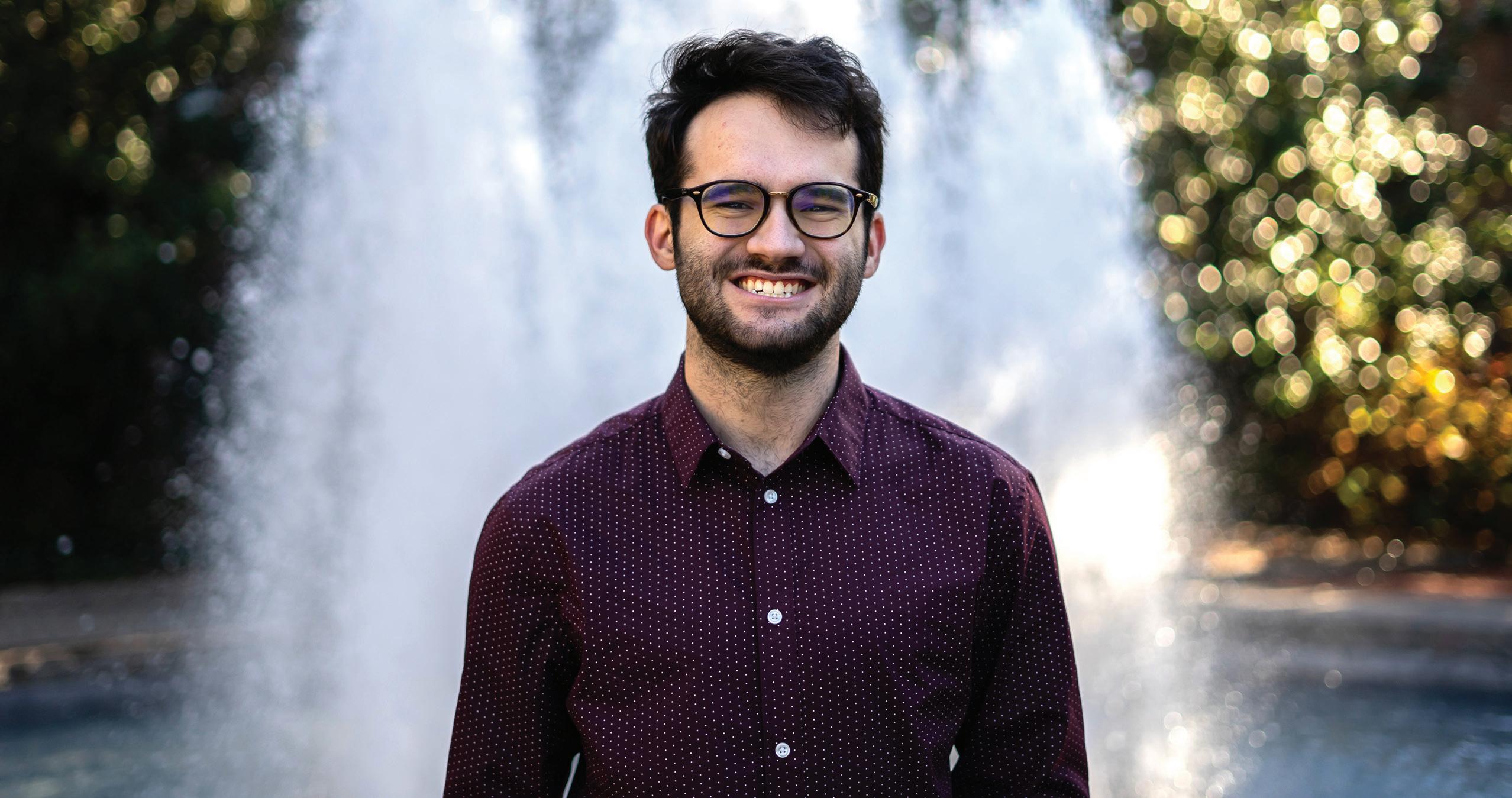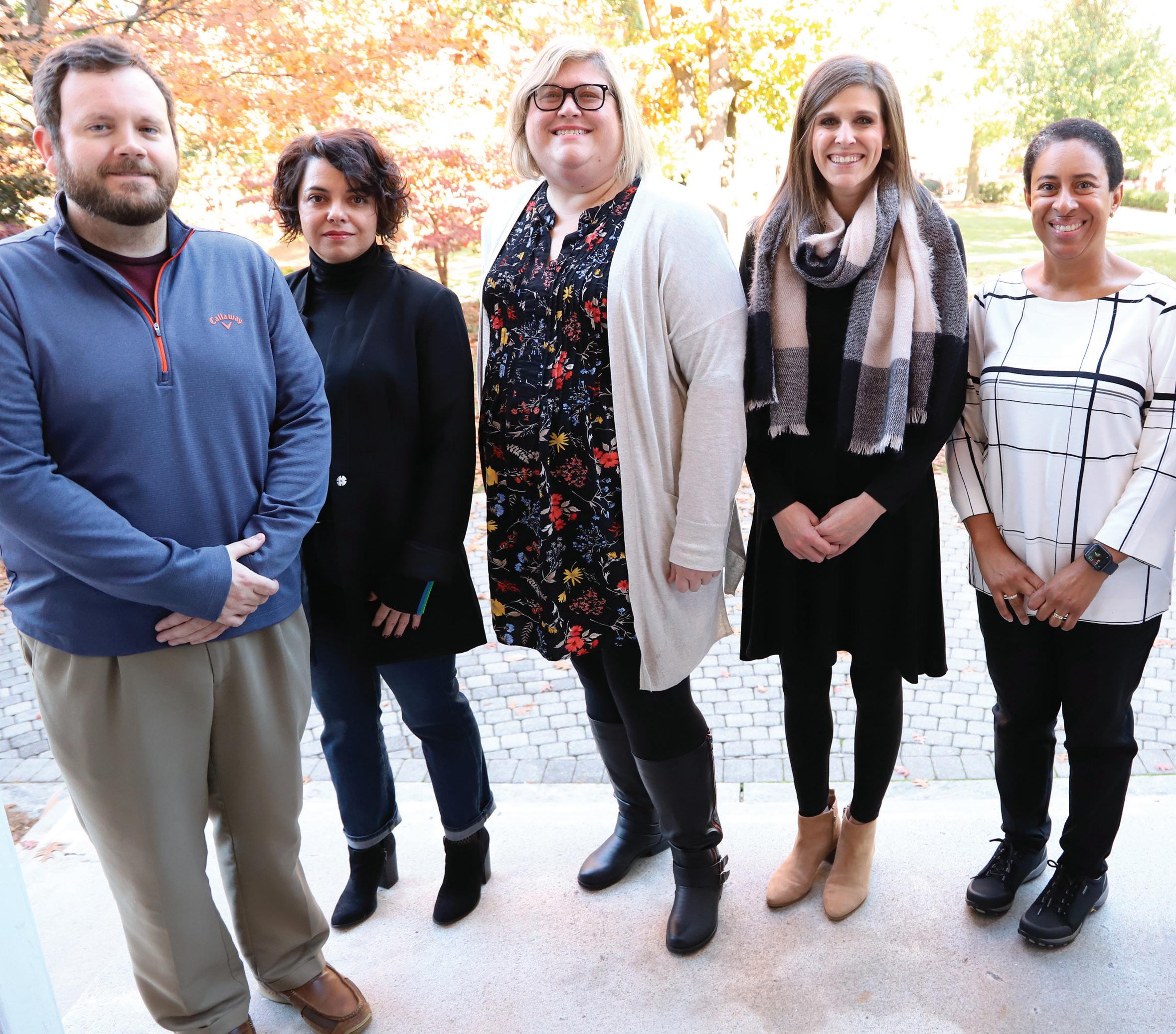
4 minute read
Soil chemistry
Soil research
Joshua Thedford prepares for a future focused on chemistry
Advertisement
Stephanie Schupska
Joshua Thedford has a favorite soil, and the week before spring break at UGA, he was about to run out of it.
He hefted the remnants of the final bag, which weighed close to 30 grams. It was enough to add to 30 small glass bottles—and get him closer to his goal of solving a mystery of soil chemistry.
Joshua has been working with soil in airless conditions, studying its content of iron and dissolved soil organic matter. He’s trying to figure out what happens to that dissolved soil organic matter when it is exposed to air.
“There’s this phenomena that happens if you have soil that’s been incubated anaerobically, meaning without oxygen for a long time,” he said. “There’s a buildup of Fe(II)—iron two— which is a reduced iron. If you suddenly oxidize that soil, so take it from Fe(II) to Fe(III)—iron three—in organic matter in the soil, there’s an unexplained pulse of carbon dioxide. I’m investigating the mechanisms for that.”
An Honors junior and CURO Honors Scholar, Joshua’s journey to soil chemistry started in high school. He was considering a career in agriculture, and his interest in chemistry—developed in an AP chemistry course at his high school on the outskirts of Atlanta— led toward a major in environmental chemistry.

Joshua Thedford scoops and weighs a soil sample for a research project he is working on in the Thompson lab.
Stephanie Schupska
As a freshman, Joshua took a seminar course specifically designed for CURO Honors Scholars. Part of his homework was to contact several professors that he was interested in working with.
“I had four professors I was emailing in a series,” he said. “Dr. Thompson was my second one, and two minutes after I emailed him, he emailed me back.”
Aaron Thompson is an associate professor of environmental soil chemistry in the College of Agricultural and Environmental Sciences.
“I really like the energy that undergraduates bring to the lab,” Thompson said. “Josh in particular is endlessly curious and energetic about finding out new things and contributing to science. I also really like the ability to provide undergraduates with research opportunities because I know that it can mean so much in terms of their development.”
Joshua has been working in Thompson’s lab for seven semesters and is taking two classes with him this semester.
Aaron Thompson, Associate professor, College of Agricultural and Environmental Sciences
“I’m taking soil chemistry and environmental measurements,” Joshua said. “The way Dr. Thompson talks is slowly becoming my internal monologue.”
Joshua also travels to chemistry conferences with Thompson, where he is able to discuss his research through oral presentations. He says the annual CURO Symposium at UGA—where he has presented twice—is really good practice.
“Presenting is kind of nerve-racking, because some of the attendees know more about my research than I do,” he said. “After I was done presenting at the American Chemical Society National Conference (in California in August), this guy recommended about 17 different things I could do to improve my project. It was very good constructive criticism.”
Joshua spent his spring break studying and taking the GRE—he will be applying to graduate schools in the fall. He’s also preparing for the GRE chemistry subject test and emailing faculty across the country to see who he might like to study and work with.
Back in the lab, he scoops tiny portions of soil into glass bottles. He’s already dealt with disappointment in his research—the first type of soil he was studying did not carry enough microbes with iron reducing capabilities to produce measurable results. He switched to a soil called El Verde, which is from Luquillo, Puerto Rico.
“The dormant microbes in there use iron as an electron acceptor in their food pathway, so as they’re consuming food, they use iron and reduce it,” he said. “That’s very good for my experiment because it’s about reduced iron.”
Joshua’s goal is to learn more about understudied areas of soil chemistry.
“Josh has been working on his own research project that is an outgrowth of work I do on the interaction of iron and carbon in soils,” Thompson said. “His work has given us a view of the very early stages (less than one hour) of iron oxidation in soils and how that impacts carbon cycling. This is not something that anyone has ever measured before because it is challenging.
“Josh’s work has illustrated there are rapid changes in CO2 efflux that we don’t fully understand. Based on his work, we now think most of these changes have to do with the production of free radicals, and Josh has now moved his research focus in that direction.”
His next step is to make the iron and organic matter complexes in a test tube.
“Soil is very complex,” Joshua said. “Hopefully we’ll be able to identify and approximate what’s happening in the soil by studying iron and organic matter in a test tube. So that’s next.”









